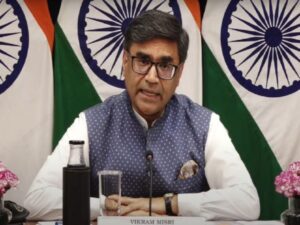IMF gives approval for USD 3 billion stand-by arrangement for Pakistan
Islamabad [Pakistan], July 13 (ANI): In a relief to the cash-strapped country, International Monetary Fund (IMF) on Wednesday approved a 9-month Stand-By arrangement for Pakistan to support the country’s economic stabilization program, Pakistan-based Geo News reported.
IMF in a statement said, “Today, the Executive Board of the International Monetary Fund (IMF) approved a 9-month Stand-By Arrangement (SBA) for Pakistan for an amount of SDR 2,250 million (about USD 3 billion, or 111 percent of quota) to support the authorities’ economic stabilization program.”
Earlier in June, Pakistan and IMF reached a staff-level agreement (SLA) of USD 3 billion which was a much-needed relief for the cash-strapped country. The IMF’s announcement on Wednesday came after Pakistan Finance Minister Ishaq Dar said that Pakistan received USD 1 billion from the UAE as part of its financial commitment to help Pakistan receive the IMF bailout package.
In a televised address on Wednesday, Ishaq Dar said, “We have received USD 1 billion from the UAE. The UAE has deposited the amount into the State Bank account,” Geo News reported. Earlier on Tuesday, Ishaq Dar announced that Saudi Arabia deposited USD 2 billion in the State Bank of Pakistan account to help boost Pakistan’s foreign reserves.
On June 30, Pakistan signed a short-term IMF deal under which Islamabad will receive USD 3 billion over nine months, subject to approval by the IMF’s board, according to Geo News report. After months of delays, cash-strapped Pakistan secured the IMF bailout package after taking tough economic measures, including raising interest rates and increasing taxes to meet IMF conditions, as per the Geo News report.
Pakistan Prime Minister Shehbaz Sharif has called the approval of IMF’s SBA a major step forward in the government’s efforts to stabilise the country’s economy. He stressed that IMF’s decision bolsters Pakistan’s economic position to overcome economic challenges. He expressed gratitude to IMF Managing Director Kristalina Georgieva for their support.
Taking to his official Twitter handle, Shehbaz Sharif wrote, “The approval of Stand-by Agreement of $3 billion by the IMF’s Executive Board a little while ago is a major step forward in the government’s efforts to stabilise the economy and achieve macroeconomic stability. It bolsters Pakistan’s economic position to overcome immediate- to medium-term economic challenges, giving next government the fiscal space to chart the way forward.”
He further said, “This milestone, which was achieved against the heaviest of odds & against seemingly impossible deadline, could not have been possible without excellent team effort. I would commend Finance Minister Ishaq Dar & his team at the Ministry of Finance for their hard work. My special thanks are also due to @KGeorgieva, MD of IMF and her team for their support & cooperation.”
Meanwhile, Pakistan’s falling economic situation, inflation, uncertain policy environment and volatile banking rates are making the business class depressed and also making them lose confidence in the economy, Federico Giuliani wrote in InsideOver.
Recently, Overseas Investors Chambers of Commerce and Industry (OICCI) revealed a grim account of the faith reposed by businessmen in Pakistan’s industry and economy.
Overall Business Confidence Score (BCS) stood at negative 25 per cent during the survey conducted in March-April 2023 (Wave 23), which was 21 per cent lower than the previous level of negative 4 per cent seen during the last such survey conducted in September-October 2022 (Wave 22).
A decline of 25 per cent in a matter of 6 months is indicative of the pace at which confidence in the Pakistani industry is waning. According to InsideOver, the three major threats to business growth identified in the survey were high Inflation (82 per cent of respondents), high taxation (74 per cent), and Pakistani rupee devaluation (72 per cent).
Considering the data, Amir Paracha, President of OICCI said that there is no surprise that the overall Business Confidence dropped after considering the volatile and extremely challenging economic situation during the past year.






